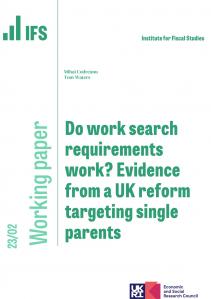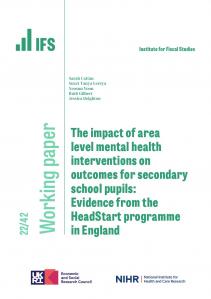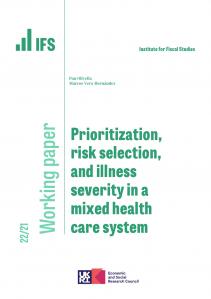Collection

After each Autumn Statement, Budget and Spending Review, we publish analysis of the Chancellor's proposals and reforms.
The Autumn Statement 2013 was delivered by the Chancellor of the Exchequer, George Osborne, on Thursday 5 December. IFS researchers presented their analysis at a briefing in London on Friday 6 December.
Presentation from the IFS autumn statement 2013 briefing
- Opening remarks, Paul Johnson
- The third most important thing that happened yesterday? (Public finances), Carl Emmerson
- Living standards, David Phillips
- Autumn Statement policy measures, James Browne
- Energy policy and domestic bills, George Stoye
A recent observation A give and take Autumn Statement? and a background briefing Autumn Statement 2013: giveaways=takeaways? provide useful context.
George Osborne presented his last official statement on the public finances in March 2013. IFS staff analysed these announcements at a briefing held the following day. Slides from these presentations can be found on our Budget 2013 page.
In June 2013, George Osborne announced how the current government would allocate spending on public services in 2015-16. Analysis by IFS staff of the implications of these announcements can be found on our Spending Review 2013 page.
The IFS Green Budget 2013, funded by the Nuffield Foundation, was published on 6th February. The document and slides from the launch are available here. In particular, the analysis includes chapters looking at:
- In an IFS observation 'Cutting the deficit: three years down, five to go?', Gemma Tetlow examines the progress of the government's fiscal consolidation plan.
- In a Public Finance Magazine article, Biting the bullet on fiscal targets, Carl Emmerson and Gemma Tetlow discussed the Chancellor's fiscal rules and the merits of abandoning his supplementary debt target.
- In The Fiscal Challenge Ahead, IFS researchers outline the significant challenges we face as a result of the spending pressures created by population ageing and a likely loss of tax revenues from motoring and north sea oil and gas companies.
- Rowena Crawford and Paul Johnson examine what is happening to the composition of public spending in The rapidly changing state, an IFS observation.
- In an IFS observation, researchers examine the Chancellor’s previously stated intention to reduce welfare expenditure by a further £10 billion per year by 2016–17 and explore where the cuts might be made.
- IFS researchers produced a Briefing Note, examining the changing composition of public spending. They find that the shape of the state today is very different from that of 30 years ago and that spending on health, pensions and long term care is set to take up a far greater share of public expenditure unless there is significant reform, or unless total spending is significantly increased.
- A briefing note on Pensioners and the tax and benefit system, examines the ways in which the proposals produced by the Dilnot Commission on the Funding of Care and Support could be funded.
- A report on NHS and social care funding: the outlook to 2021/22 examines what can be expected once the current period of broadly flat NHS funding in real terms ends in 2014-15.
- IFS researchers have compiled a list of tax and benefit changes in each Budget since 1979.
- In two recent observations, IFS researchers examine The Effects of the Welfare Benefits Up-rating Bill and review the key features of the new 'High Income Child Benefit charge'.
- We examine the pensions White Paper detailing plans to replace the current Basic State Pension and State Second Pension with a single state pension in an IFS observation.
- In a Fiscal Studies journal article, researchers analyse the likely effects of introducing a new Universal Credit.
- In a report, Fairer by design: efficient tax reform for those on low to middle incomes, Paul Johnson draws on the Mirrlees Review of taxation to identify key reforms that could help to ease the squeeze on living standards by making the UK tax and benefit systems both more efficient and fair.
- In Tax by Design, the Mirrlees Review editorial team present a picture of coherent tax reform. Its aim is to identify the characteristics of a good tax system, to assess the extent to which the UK tax system conforms to these ideals, and to recommend how it might realistically be reformed in that direction.
- In a recent report funded by the Joseph Rowntree Foundation, "Living Standards, Poverty and Inequality in the UK: 2013", IFS researchers analyse official statistics on the distribution of income and the extent of poverty in the UK in 2011-12
- An IFS report, Child and working-age poverty in Northern Ireland from 2010 to 2020, updates previous IFS projections of household incomes and poverty at the UK level and extends this analysis by showing projections for Northern Ireland (and, in an appendix, for England and Wales and for Scotland).
- A chapter from the Green Budget 2013, Tax and welfare reforms planned for 2013-14, gives an overview of the tax and welfare reforms currently planned for the coming financial year and their likely impact on household incomes.
- In “Really, we’re in it together”, Paul Johnson looks at the extent to which falling household incomes have been equally spread across the income distribution.
- In an IFS observation Measuring and addressing child poverty, IFS researchers take the opportunity to reflect upon what child poverty is and how it should be measured, and to discuss current government thinking in this policy area.
Collection details
- Publisher
- IFS
More from IFS
Understand this issue

Election Special: Your questions answered
27 June 2024

Election Special: The big issues politicians haven't spoken about
25 June 2024

Cuts to council services likely unless cost pressures abate – even with the biggest council tax increases for 20 years
21 June 2024
Policy analysis

How would the parties’ tax and spending plans affect Scotland and Wales?
28 June 2024

How should we interpret parties’ public spending pledges this election?
23 June 2024

Main parties’ manifestos tell us little about the funding individual public services would actually receive
23 June 2024
Academic research

Do work search requirements work? Evidence from a UK reform targeting single parents
1 February 2023

The impact of area level mental health interventions on outcomes for secondary school pupils: Evidence from the HeadStart programme in England
13 October 2022

Prioritization, risk selection, and illness severity in a mixed health care system
16 June 2022